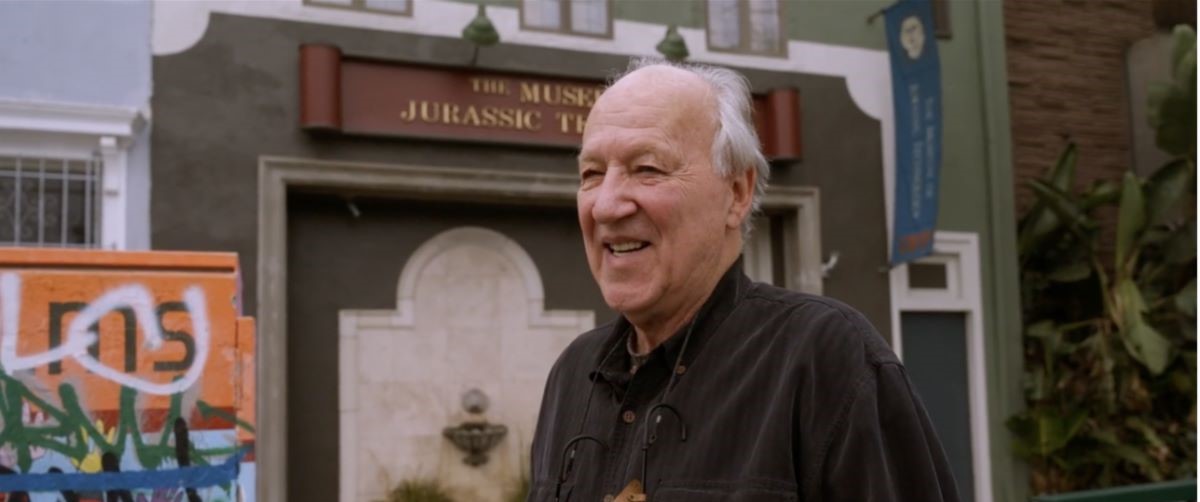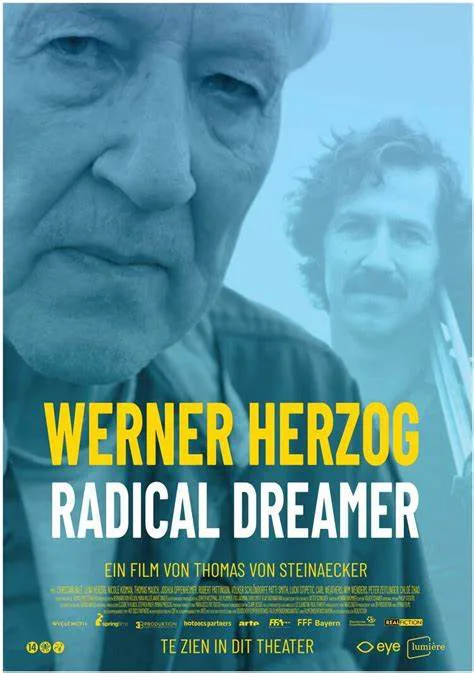You do a disservice to Werner Herzog‘s movies—and maybe Herzog himself—by uncritically reducing them to extensions of his singular personality, known predominantly in American pop culture as a whimsical mythomaniac with a funny accent. To their credit, the makers of the artist’s profile documentary “Werner Herzog: Radical Dreamer” interview some of Herzog’s collaborators, including a couple of his directors of photography, some other New German Cinema contemporaries, and a few celebrity actors from his movies, like Nicole Kidman and Robert Pattinson.
Unfortunately, even if you are a Herzog fan, you, too, might struggle to remember when he directed the stars of two very different Batman movies—does anyone really love “Queen of the Desert?”—or wonder why their praise for Herzog is so dull and inessential. How is there so much filler in an homage to a man whose exacting standards and fanatical vision led him and a team of workers to schlep a steamship over a Peruvian mountain?
Herzog is the main topic of discussion, though never the primary interviewee in “Werner Herzog: Radical Dreamer,” which re-prints, rather than re-contextualizes a number of Herzog legends. Some commentary is obviously more valuable than others. If you’re watching this movie, there’s a fair chance that you already know some of the featured stories, like how Herzog threatened the magnetic but disturbed actor Klaus Kinski with a gun on the set of Herzog’s mad 1972 conquistador drama “Aguirre, The Wrath of God.”
Check out Carl Weathers, Herzog’s “The Mandalorian” co-star, as he briefly raves on camera about Herzog’s unhinged 2005 docu-character study “Grizzly Man.” And while you’re here, how about some face-time with Lucki Stipetic, Herzog’s brother and long-time producer, who talks about some of their more memorable collaborations. “Werner Herzog: Radical Dreamer” might be worth a look if you’ve already seen Herzog’s movies and now want to hear somebody as in-the-know as Stipetic dryly affirm that, “Dragging a ship over a mountain seemed like a wild idea, right?” Herzog fans might also soon become frustrated by this movie’s unrevealing interviews.
To be fair, the defensive cult worship that’s developed around Herzog makes sense given that he was and proudly remains quite a character. It’s also frustrating to watch a documentary try and mostly fail to approximate the mercurial dreaminess that’s come to define Herzog and his movies. Some of his most irritating fans dismiss criticism of his apolitical art, which often represents the world as it’s felt during a wild, sometimes transformative state of emotional upheaval. Then again, it’s really hard to approximate the head-spinning ecstasies and ingenuities of Herzog’s movies without showing more than a few clips from them, sandwiched carelessly between over-edited on-camera commentary.
Sometimes the movie’s tendency of favoring movie clips and bombastic soundbites doesn’t really matter since the juxtaposition of so many clashing personalities still creates its own lunatic harmony. In the movie’s most disarming and logic-frying transition, we jump from fellow New German Cinema filmmaker Wim Wenders, who seems to be on to something when he suggests that Herzog “shaped the American perception of Germans like no one else,” to Carl Weathers, who says that, “Werner…is a form…of Darth Vader.” I don’t entirely understand what either man’s talking about, but hearing them say this much and in such close proximity to each other seemed appropriately screwy and poetic.
Then again, not every scrap of footage that’s piled into “Werner Herzog: Radical Dreamer” adds something essential. Some footage is surreal in a colorful way, like when Herzog’s grandson goes ski-jumping soon after we see footage from “The Ecstasies of Woodcarver Steiner,” Herzog’s 1974 documentary short about Swiss ski jumper Walter Steiner. It’s less amusing to watch Herzog drive around Los Angeles, talking about the city’s fundamental appeal as a place where, “People don’t just talk about it, they actually do it.” Ok, but also huh?
Part of the appeal of a Herzog documentary depends on how much it reflects Herzog’s indelible sketchiness, but why, oh why, don’t the filmmakers ask follow-up questions of, say, “The Act of Killing” director Joshua Oppenheimer, who suggests that, when Herzog manipulates reality in his documentaries, he’s not deceiving us, but rather showing us something that’s “always there that we might not see otherwise.”
Better yet, why isn’t there more interview footage of Stipetic, whose po-faced commentary suggests that he might have been the movie’s best supporting character? (Stipetic on why they couldn’t pay Jack Nicholson five million dollars to star in “Fitzcarraldo”: “That wouldn’t have left much budget.”) Some people might enjoy a solitary clip from a Henry Rollins interview, as well as occasional anecdotes from “Rescue Dawn” star Christian Bale (another Batman!). Others might wonder why we’re watching a chaotic docu-salute to Herzog when we could be watching a Herzog movie instead.
On VOD tomorrow, December 5th.




















